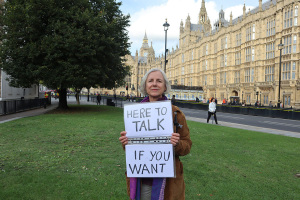Two Books Every Follower of Jesus Should Give and Get for Christmas
I have been a follower of Christ for more than 30 years. During that time I have read innumerable books on Christian living, commentaries, study guides, Christian growth, and fiction. There is probably no category untouched. In addition to reading many books about the Christian life, I have poured over the Bible for both study and reading.
From all the books and commentaries I have used, though, if I were asked of a list of books followers of Jesus should read now to help them understand the Bible better, it would be these two:
Misreading Scripture With Western Eyes, by Richards and O'Brien, and Fixing Abraham, by Chris Tiegreen.
Both of these books, in different ways, address one of the biggest problems 21st century Western Christians face–our cultural and temporal separation from the original Biblical events. This separation allows the centuries of cultural prejudice to color and confuse our understanding of scripture. Things that are "as plain as the nose on your face," may in fact be as muddied as the puddle at your feet.
Using their past cross-cultural experience for a lens, E. Randolph Richards and Brandon J. O'Brien explore how cultural differences actually blind us to a correct understanding of the scripture. They correctly note:
It is important for us to remember that when we read the Bible in our native language, mostly what has been changed is the words. Behind the words, now in a language we understand, remains that complex structure of cultural values, assumptions and habits of mind that does not translate easily, if at all. If we fail to recognize this–and we very often do–we risk misreading the Bible by reading foreign assumptions into it. Like Procrustes of Greek mythology, who shortened or lengthened his guests to fit his bed, our unconscious assumptions about language encourage us to reshape the biblical narrative to fit our framework.
Tiegreen, on the other hand, demonstrates how we have "tamed" our heroes of the Bible, often due to our lack of perception as to how radical those events were when then happened. Subtitled, "How Taming Our Bible Heroes Blinds Us To The Wild Ways Of God," Tiegreen gives this example:
The Law was very explicit in its prohibitions against eating the blood in animal meat, to the degree that the very idea of eating or drinking any amount of blood was considered grossly immoral. And this wasn't just a cultural taboo; it was divine law given at Mount Sinai by a thundering voice from heaven. "As for the life of all flesh, its blood is identified with its life. Therefore I said to the sons of Israel, 'You are not to eat the blood of any flesh, for the life of all flesh is its blood; whoever eats it shall be cut off" (Leviticus 17:14). With this firmly in mind as an eternal, divine ordinance, imagine listening to Jesus teach one day and hearing the words, 'Truly, truly, I say to you, unless you eat the flesh of the Son of Man and drink His blood, you have no life in yourselves…For My flesh is true food, and My blood is true drink (John 6:53, 55, emphasis added).
If you read either of these quotes and thought, "Wow, never knew that," these books are for you. If you thought, "I don't get it," these books are for you.
If we are to be good students of the Word, then the context of the narratives, cultural references, idioms and the like are incredibly important. These books will help you and/or your favorite Bible student learn how to better divide the Word of Truth.





























